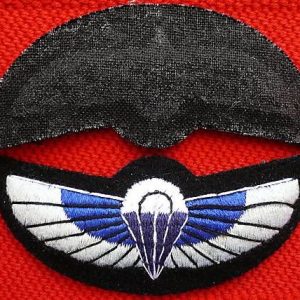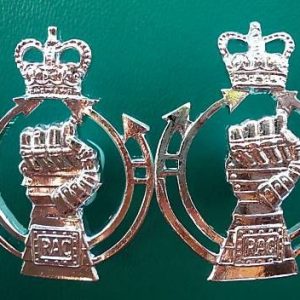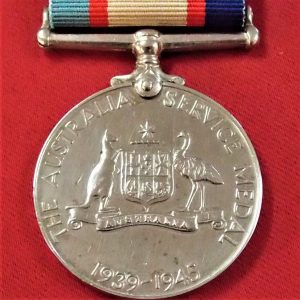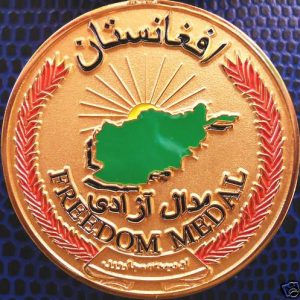**SOLD** WW1 BRITISH BOER WAR OFFICER SERVICE MEDAL QUEENSLAND MOUNTED INFANTRY QMI
$1,995.00
SOLD
*SOLD*
Offered is a Boer & First World War set of service medals to Major Percy Fielden, who served with the King's Royal Rifle Corps & Queensland Mounted Infantry between 1895 and 1920. Fielden also served as Aide-De-Camp to the Governor's of New Zealand and Queensland.
1st type (visible ghost dates) Queen's South Africa Medal with campaign bars CAPE COLONY & RHODESIA, engraved to: Lieut. P.H.G. Feilden. 7th. K.R.R. (Attad. Queensland Mtd. Inf.
British War & Victory Medals, impressed to: Major P.H.G. Feilden
1935 Royal Jubilee Medal, un-named as issued
1937 Royal Coronation Medal, un-named as issued
Medals are period swing mounted for wear and housed in a leatherette medal case. Medal rolls confirms Q.S.A. award with bars, as does the M.I.C. for WW1. This set will be posted free worldwide.
Major Percy Henry Guy Feilden was born in 1870 and was the son of Lieutenant-General R.J. Feilden, C.M.G.. He was commissioned Second Lieutenant, with the 7th Battalion, King's Royal Rifle Corps (Militia), August 1895; appointed an Extra Aide-de-Camp to the Rt. Hon. The Earl of Glasgow, G.C.M.G., Governor and Commander-in-Chief of New Zealand, February, 1896; promoted Lieutenant, January 1897; appointed an Extra Aide-de-Camp to the Rt. Hon. Lord Lamington, K.C.M.G., Governor and Commander-in-Chief of Queensland, June 1899; appointed Lieutenant, 3rd Queensland Mounted Infantry, 15.2.1900, and served in South Africa during the Boer War; invalided to Australia, where he arrived, 1.9.1900; promoted Captain, 12.3.1904; Major, 2.2.1915; served during the Great War with the 6th Battalion, King's Royal Rifle Corps; retired, 10.7.1920; in later life was a Justice of the Peace and a Deputy Lieutenant of Oxfordshire, and was High Sheriff of Oxfordshire in 1938; died at home at Witney, Oxfordshire, 25.3.1944.
Boer War Service of 3rd Contingent of the Queensland Mounted Infantry
This contingent, 320 mounted infantry, commanded by Major W H Tunbridge, sailed on the Duke of Portland upon 1st March 1900; arrived at the Cape on 3rd April, and was sent to Beira, where it arrived before the middle of April. The contingent was a portion of the Australian Bushmen Corps which in January 1900 it had been arranged to send to South Africa.
In his evidence before the War Commission General Plumer mentioned "that before the relief of Mafeking was effected in May 1900, he was joined by a Canadian battery and by some Queenslanders, part of the force which was landed at Beira". These Queenslanders were 'D' Squadron of the 3rd contingent, Captain Kellie and Lieutenants Fowles, Harris, and Annat being among the officers. General Plumer spoke very highly of these troops, as of all the Australians and New Zealanders who served under him, and he had the most ample opportunities, throughout two years' campaigning, of putting the qualities of his men to all manner of severe tests.
After Mafeking was relieved, Captain Kellie's men moved eastward with Generals Baden-Powell and Plumer, via Ottoshoop and Zeerust to the Rustenburg district, where they were employed during July and August. In the fighting at Rosters River, 22nd July (see 1st NSW Bushmen), the Queensland detachment had Lieutenants Walsh and Leask and 6 men wounded. Lieutenant Leask died of his wounds at Pretoria on 20th August.
Captain H C W Hamilton, who had been left sick in hospital at Marandellas, died there on 12th July 1900.
The larger portion of the 3rd contingent, under Major Tunbridge, also crossed Rhodesia and entered the Transvaal from about Mafeking, but they were not to see Kellie's squadron for a long time. The contingent, like other regiments of the Rhodesian Field Force, was thus much split up.
Mr Green, who was at Elands River during the investment, says in his 'Story of the Australian Bushmen' that on 19th July Major Tunbridge, with a detachment of his Queenslanders, brought a convoy into camp. It had been intended that Tunbridge and his men should join Baden-Powell about the Megato Pass; but in view of the great strength of the enemy in the neighbourhood, that was found to be impracticable. As things turned out, it was most fortunate that this squadron remained at Elands River, as Tunbridge and his men were a very valuable part of the garrison when the post was attacked on 5th August, and throughout the investment, 4th to 16th (see Rhodesia Regiment). During that period the Queenslanders lost Lieutenant Annat, killed — he had been previously wounded—and they had about 12 other casualties. The subsequent history of the 3rd Queensland Bushmen is very much akin to that of the 4th Queensland Contingent. Having been railed to Pretoria, where they were inspected and congratulated by Lord Roberts, the Elands River squadron joined the rest of the contingent, the column commander being Colonel Hickman, whose troops acted with General Plumer in numerous engagements in the country north and north-east of Pretoria, including the battle at Rhenoster Kop on 29th November. In December Colonel Jeffreys took over Hickman's column. A detachment under Major Tunbridge had a sharp fight on 23rd January 1901 near Balmoral (see New Zealand Mounted Rifles). On 3rd February Plumer's troops were railed to Cape Colony to endeavour to expel De Wet, who had crossed to the south of the Orange with a strong force. The work in the pursuit was most arduous, and, as will be seen from the Mentions, this contingent saw sharp fighting. Major Tunbridge distinguished himself in the action of 12th February 1901 (see 4th Victorian Contingent and New Zealand - 3rd Contingent).
The contingent accompanied Plumer in his chase after De Wet's commandos through the Orange River Colony to the Brandfort district, whence they were railed to the north of Pretoria. They then took part in the expedition to Pietersburg, and in May were relieved from further service in South Africa.
(http://www.angloboerwar.com)
| Weight | 0.1 kg |
|---|---|
| Dimensions | 10 × 6 × 3 cm |













